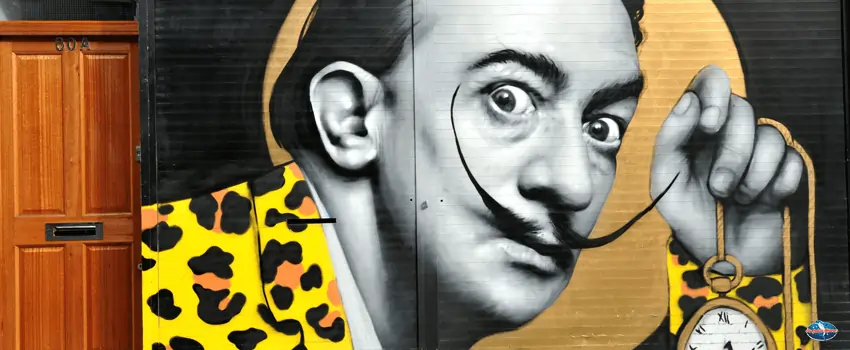Salvador Dalí needs no introduction – his artwork speaks for him. From the melting clocks of “The Persistence of Memory” to his interpretations of bizarre dreams, Dalí is the premier surrealist of his time. Dalí’s works have inspired everyone from Disney to musicians, filmmakers, and beyond. Around the world, Salvador Dalí art pieces adorn museum walls and inspire public installations. But did you know that St. Petersburg lays claim to one of the largest private collections?
The Dalí is a must-see attraction just around the corner from John’s Pass at Madeira Beach. From his eccentric personality to his iconic works, Dalí’s presence resonates with St. Petersburg visitors.
Who Is Salvador Dalí?
Born Salvador Domingo Felipe Jacinto Dalí i Domènech in the Spanish town of Figueres, Dalí’s passion for art began at an early age. When he was 14, Figueres’ theater hosted Dalí’s first exhibit, which his father put on. Soon after that, the aspiring artist enrolled in his first college, the San Fernando Academy of Art of Madrid.
Dalí spent his Sundays studying masterpieces of the art world at the local Prado Museum. From there, he brought his inspired mind to the classroom. His study of Cubism sparked interest in his work among his peers.
As Dada and Futurism (two avant-garde art movements that reject logic and reason) crept into his mind, Dalí’s eccentricity elevated. Having achieved recognition for his artistic skills, he dropped out of the Academy after four years. Rather, the Academy expelled him. He refused to accept examination by the Academy’s professors because he deemed them incompetent to judge his works.
Free from the limitations of traditional education, Dalí traveled to Paris, where he would soon meet Pablo Picasso and Andre Breton. There, Breton introduced him to Surrealism, and Dalí’s interest in the bizarre blossomed. From that point on, Salvador Dalí art pieces would receive international attention.
Dalí and the Morse Family
Though the man himself never visited Florida, many paintings of Salvador Dalí and by Salvador Dalí live at The Dalí in St. Petersburg. The museum’s collection includes original Salvador Dalí paintings, sketches, large-format pieces, and strange objects and sculptures that defy reality. The Dalí hosts over 2,400 Dalí works, making it the single most extensive collection of privately owned Dalí art outside of Spain.
How did St. Petersburg come to be the home for such a collection? It all began with a lifelong passion for Dalí’s work curated by Albert Reynolds and Eleanor Morse.
In 1943, the same year the couple married, the Morses purchased their first Salvador Dalí painting. “Daddy Longlegs of the Evening – Hope!” became the first in their extensive collection, for which the Morses paid $2,950. Their passion for Dalí’s work eventually led to more purchases and a friendship between Dalí and his wife, Gala.
The Morses’ success in business allowed them to own more of Dalí’s work. The Injection Molders Supply Company, located in Beachwood, Ohio, founded by Reynolds Morse, became the de facto location for much of their collection. There, the Morse family founded the original Salvador Dalí Museum. As their collection grew, space came at a premium, and the couple soon found themselves with more art than they could display.
Over the years, the Morses enjoyed first-choice of Dalí’s work. By the mid-1970s, the couple had amassed so many of the master’s works that they grew concerned about the collection’s separation over estate taxes. It was then that St. Petersburg stepped in with a solution.
The Florida legislature, enticed by the nationwide hunt for a new location for the Dalí works, provided funds to renovate a warehouse in St. Petersburg to house the collection. Thus, the Salvador Dalí Museum, St. Petersburg, opened in 1982.
A Unique Vision for St. Petersburg’s The Dalí
The original site of The Dalí drew international attention. Visitors numbered in the hundreds of thousands by the end of the millennium. Even so, the museum faced similar issues Reynolds and Eleanor faced years before: space constraints.
By 2008, plans for a new location for the Salvador Dalí art pieces came to fruition. Architect Yann Weymouth of St. Petersburg-based HOK received the task of interpreting Dalí’s signature style into architecture. To live up to the artist’s reputation, the museum features an out-of-this-world design known simply as the “enigma.”
The geodesic glass bubble is made up of 1,062 triangular pieces of glass and stands 75 feet tall, a homage to a similar construct at Dalí’s home in Spain. The museum has three floors, all connected by a helical staircase referencing Dalí’s obsession with DNA molecules and spirals.
As with most Salvador Dalí famous paintings, there is more than meets the eye to The Dalí. Located on the Florida coast, an area prone to dangerous weather, the museum has eighteen-inch thick hurricane-proof walls that can withstand even the worst hurricane.
Visitors can enjoy Spanish tapas and watch films about the artist on the first floor. On the second floor, The Dalí Museum Center for the Avant-garde offers students, researchers, and professionals resources for studying the artist, Surrealism, and the avant-garde. Guests will find the extensive collection of Salvador Dalí famous paintings on the third floor.
Visit St. Petersburg today.
Salvador Dalí art pieces can fetch a pretty penny. In 2011, Dalí’s “Portrait of Paul Eluard” sold for $22 million at auction. Enjoying the master’s work in person is a priceless experience, however. Visitors to The Dalí are only forty-five minutes from John’s Pass at Madeira Beach, west of St. Petersburg. For more information on The Dalí, visit www.thedali.org.
While Dalí himself never visited Florida, his art reflects his interest in the sea. In 1959, photographer Robert Descharnes took a photo of Dalí with a dolphin on his head. Several of the artist’s sketches feature dolphins and even mermaids. You, too, can snap a photo of a dolphin and be inspired by the sea aboard the best St. Pete Beach dolphin cruise, the Dolphin Quest.







